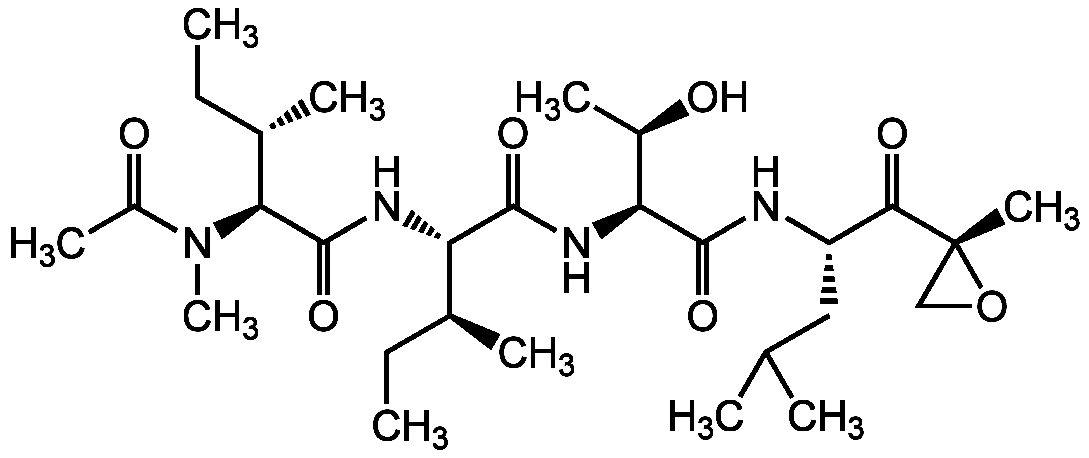
Chemical Structure
Epoxomicin [134381-21-8]

AG-CN2-0422
Overview
- SupplierAdipoGen Life Sciences
- Product NameEpoxomicin [134381-21-8]
- Delivery Days Customer10
- CAS Number134381-21-8
- CertificationResearch Use Only
- Estimated Purity>97%
- Molecular FormulaC28H50N4O7
- Molecular Weight554.7
- Scientific DescriptionAntibiotic [1]. Potent anticancer compound [1, 7]. Cell permeable, potent, selective and irreversible 20S proteasome inhibitor. Predominantly inhibits the chymotrypsin-like (CTRL) activity of the proteasome. Exhibits lower level inhibition of proteasome trypsin-like and caspase-like activitives (100 and 1,000-fold slower rates respectively) [2, 3]. Anti-inflammatory [4]. Antimicrobial and antimalarial [8]. Anti-parasitic [9]. Stimulates bone formation by inhibiting osteoblast proteasome activity [5]. Induces Parkinsons-like symptoms in rats [6]. The ubiquitin-proteasome system (UPS) and autophagy serve as two complementary, reciprocally regulated protein degradation systems. Blockade of UPS by Epoxomicin activates autophagy. Blocks the Thymoproteasome beta5t subunit activity. - Chemical. CAS: 134381-21-8. Formula: C28H50N4O7. MW: 554.7. Synthetic. Antibiotic. Potent anticancer compound. Cell permeable, potent, selective and irreversible 20S proteasome inhibitor. Predominantly inhibits the chymotrypsin-like (CTRL) activity of the proteasome. Exhibits lower level inhibition of proteasome trypsin-like and caspase-like activitives (100 and 1,000-fold slower rates respectively). Anti-inflammatory. Antimicrobial and antimalarial. Anti-parasitic. Stimulates bone formation by inhibiting osteoblast proteasome activity. Induces Parkinsons-like symptoms in rats. The ubiquitin-proteasome system (UPS) and autophagy serve as two complementary, reciprocally regulated protein degradation systems. Blockade of UPS by Epoxomicin activates autophagy.
- SMILESCC[C@H](C)[C@H](NC(=O)[C@H]([C@@H](C)CC)N(C)C(C)=O)C(=O)N[C@@H]([C@@H](C)O)C(=O)N[C@@H](CC(C)C)C(=O)[C@@]1(C)CO1
- Storage Instruction-20°C,2°C to 8°C
- UNSPSC12352200
References
- Epoxomicin, a new antitumor agent of microbial origin: M. Hanada, et al.; J. Antibiot. 45, 1746 (1992)
- Total synthesis of the potent proteasome inhibitor epoxomicin: a useful tool for understanding proteasome biology: N. Sin, et al.; Bioorg. Med. Chem. Lett. 9, 2283 (1999)
- Proteasome inhibition by the natural products epoxomicin and dihydroeponemycin: insights into specificity and potency: K.B. Kim, et al.; Bioorg. Med. Chem. Lett. 9, 3335 (1999)
- Epoxomicin, a potent and selective proteasome inhibitor, exhibits in vivo antiinflammatory activity: L. Meng, et al.; PNAS 96, 10403 (1999)
- Selective inhibitors of the osteoblast proteasome stimulate bone formation in vivo and in vitro: I.R. Garrett, et al.; J. Clin. Invest. 111, 1771 (2003)
- Systemic exposure to proteasome inhibitors causes a progressive model of Parkinson's disease: K.S. McNaught, et al.; Ann. Neurol. 56, 149 (2004)
- Establishment and some characteristics of epoxomicin (a proteasome inhibitor) resistant variants of the human squamous cell carcinoma cell line, A431: K. Ohkawa, et al.; Int. J. Oncol. 24, 425 (2004)
- The proteasome inhibitor epoxomicin has potent Plasmodium falciparum gametocytocidal activity: B. Czesny, et al.; Antimicrob. Agents Chemother. 53, 4080 (2009)
- Evaluation of the in vitro growth-inhibitory effect of epoxomicin on Babesia parasites: M. Aboulaila, et al.; Vet. Parasitol. 167, 19 (2010)
- Mechanisms of cross-talk between the ubiquitin-proteasome and autophagy-lysosome systems: V.I. Korolchuk, et al.; FEBS Lett. 584, 1393 (2010)
